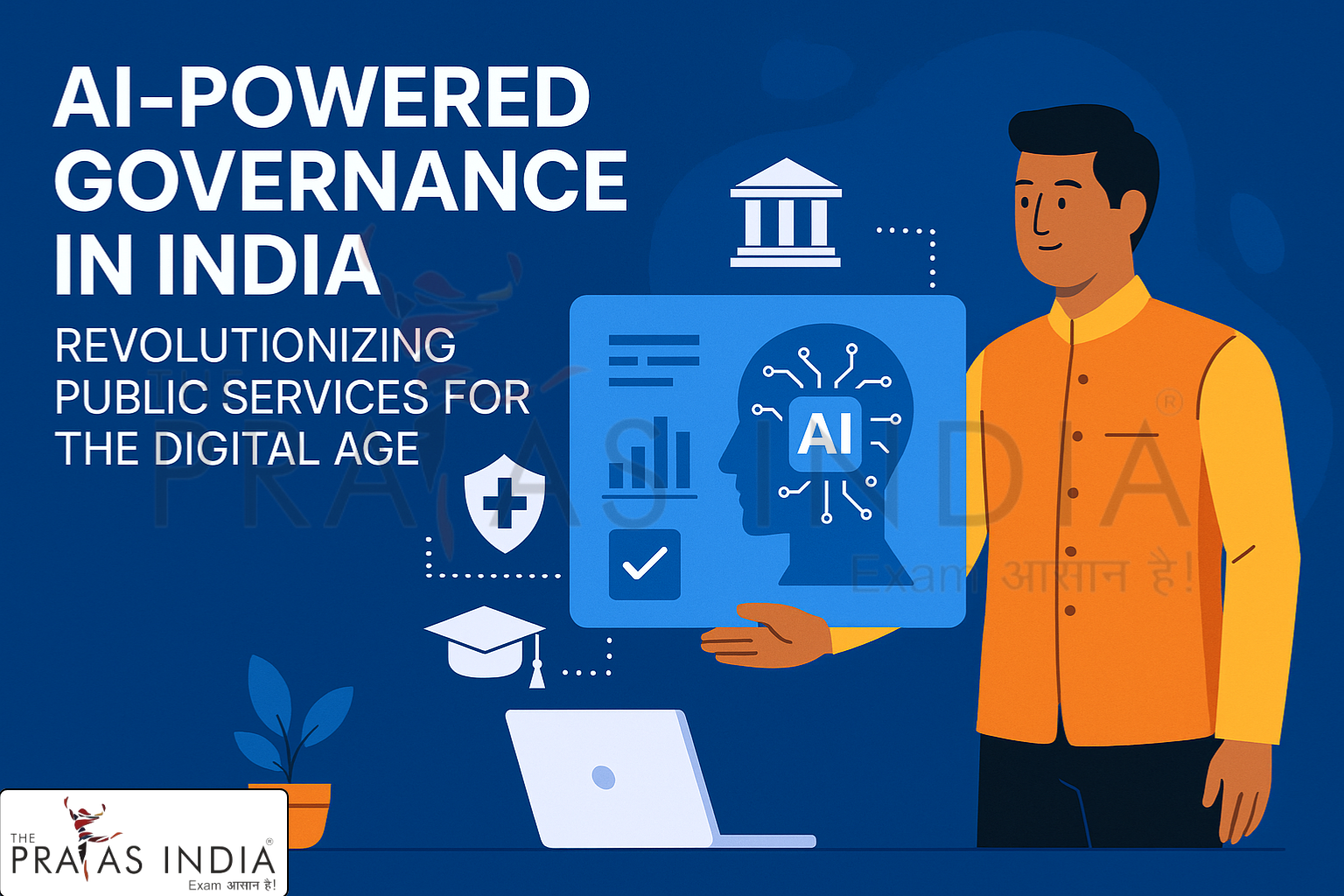AI Powered Governance in India – How India Is Using Emerging Tech for Public Service Delivery
As India continues to rise as a digital-first economy, Artificial Intelligence (AI) is playing an increasingly transformative role in the delivery of public services. From predictive analytics in agriculture to real-time monitoring in health and education, AI is no longer just a buzzword in governance—it’s a reality reshaping the relationship between citizens and the state.

The Rise of AI in Indian Governance
India’s push towards digital transformation began with initiatives like Digital India and Startup India, but in recent years, the government has started leveraging AI-powered solutions to improve transparency, efficiency, and accessibility in public service delivery.
Under the umbrella of the National Strategy for Artificial Intelligence (launched by NITI Aayog), India has outlined key sectors where AI can be integrated for social good. These include healthcare, agriculture, education, smart cities, and justice delivery. The government’s approach is not just about automation but about making governance data-driven, inclusive, and citizen-centric.
Key Applications of AI in Public Service Delivery
-
Healthcare
AI is being used in public hospitals to assist in early diagnosis and treatment planning. Tools like AI-based radiology scanners and COVID-19 detection algorithms have supported medical professionals in remote and under-resourced areas. -
Agriculture
Through AI-powered apps and models, farmers now receive crop recommendations, pest forecasts, and weather alerts, enabling them to make informed decisions. Projects like Krishi Megh and Kisan AI Chatbots are examples of how tech is reaching the grassroots level. -
Judiciary and Law Enforcement
Tools such as SUPACE (Supreme Court Portal for Assistance in Court Efficiency) help judges scan and analyse massive legal data to expedite cases. AI is also aiding police departments in facial recognition, crime pattern prediction, and surveillance. -
Education
Adaptive learning systems driven by AI are helping to personalize education for students in government schools. Initiatives like DIKSHA use AI to monitor learning outcomes and improve teacher training. -
Smart Cities and Urban Planning
AI is being used for traffic management, water and waste systems optimization, and surveillance. Cities like Pune and Hyderabad have already integrated AI in their urban infrastructure under the Smart Cities Mission. -
Direct Benefit Transfers (DBT)
AI ensures the efficiency of subsidy distribution and welfare schemes by eliminating ghost beneficiaries and improving authentication through facial and voice recognition.
Challenges and Ethical Considerations
While the benefits are undeniable, integrating AI into governance also presents challenges — particularly around data privacy, algorithmic bias, and digital inclusion. The lack of robust data protection legislation and the digital divide in rural areas must be addressed to ensure equitable and ethical use of AI.
To mitigate these concerns, India is working on regulatory frameworks and ethical guidelines for AI deployment. The Digital Personal Data Protection Act and initiatives for open-data ecosystems aim to balance innovation with accountability.
The Road Ahead
India is poised to become a global AI leader, but the success of AI in governance will depend on collaborative efforts between government, industry, and academia. Upskilling public sector employees, strengthening AI infrastructure, and promoting indigenous AI innovations are key to scaling these efforts.
AI’s potential in public service delivery is vast — from improving citizen experiences to fostering inclusive growth. With the right policies, ethical safeguards, and technological investments, India can harness AI not just for governance, but for transformative nation-building.




![Prayas-तेजस [UPSC CSE Sociology Optional] – Online & Offline](https://theprayasindia.com/wp-content/uploads/2025/09/Prayas-तेजस-UPSC-CSE-Optional-Subject-The-Prayas-India-300x300.png)
![Prayas-सूत्र [UPSC CSE Materials (Hardcopy)]](https://theprayasindia.com/wp-content/uploads/2025/09/Prayas-सूत्र-UPSC-CSE-Study-Materials-Hardcopy-The-Prayas-India-300x300.png)
![Prayas-मंत्रा [UPSC CSE CSAT]](https://theprayasindia.com/wp-content/uploads/2025/09/Prayas-मंत्रा-UPSC-CSE-CSAT-The-Prayas-India-300x300.png)
![Prayas सारथी [UPSC CSE One on One Mentorship]](https://theprayasindia.com/wp-content/uploads/2025/09/Prayas-सारथी-UPSC-CSE-One-on-One-Mentorship-The-Prayas-India-300x300.png)










